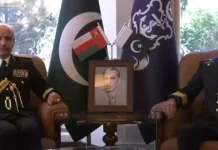By Ali Imran
ISLAMABAD: The Supreme Court (SC) issued notices to the government and Federal Investigation Agency (FIA) on Wednesday on Pakistan Tehreek-e-Insaf (PTI) chief’s plea seeking bail in the cypher case.
Today, Justice Sardar Tariq Masood, Justice Ayesha A Malik and Justice Yahya Afridi declared Imran’s plea admissible.
During the court proceedings, Justice Masood asked PTI counsel Salman Safdar “how far the matter dated back to” when he was reading the first information report (FIR) registered against Imran and Qureshi in this case aloud.
Safdar informed him that it was from 2022.
At this, Justice Masood said to the PTI counsel that the party had spent the whole year on the cypher case. He observed that some sections in the FIR cited a two-year punishment while others entailed lifetime imprisonment as well as the death penalty.
At the same time, Justice Afridi mentioned that the case inquiry maintained that the role of the co-accused would be taken into consideration during the investigation.
He asked: “What did the investigator say about Azam Khan in the final investigation report?”.
The PTI lawyer informed Justice Afridi that the probe did not convey a clear stance. He said, “Azam Khan was abducted, his family had even registered a case … afterwards, his statement came forward”.
To this, Justice Masood scoffed, stating that this is how the ‘truth’ comes forth.
Safdar, reminding the court of how his client had presented arguments before the court for hours, contended that his client had been made a victim of political revenge.
Responding to this, Justice Masood maintained that this happened because the cases were being run in a political manner.
“The accused is not under 60 years of age, and requires further inquiry,” the judge stated, calling for the hearing to focus on that.
Continuing the hearing, Justice Ayesha inquired about the basic grounds of the case. The advocate informed the judge that the sections of the case apply to espionage, contending that the case should have been registered in the first place.
He argued that the investigation “does not mention anywhere how an enemy state benefitted”.
Justice Masood noted that the code of the cypher was compromised. However, he added that, “Although the code keeps changing, it can change even after a week.”
The three-judge bench was informed by the PTI counsel that sections in the FIR in comparison to the complaint were incorrect. He further added: “The cypher was declassified as per the law and then presented in the National Security Committee (NSC).”
He also told the bench that the same was also mentioned in the SC’s verdict on the no-confidence motion held against the former PM.
Justice Masood instructed Safdar to stick to the arguments of the ongoing case, while Justice Afridi asked PTI’s counsel whether the cypher was a secret document.
The cypher, after declassification, was no longer a secret document, the advocate responded. He further added that the cypher was not shown by the accused before it was declassified.
Justice Masood inquired if waving a cypher in the air and revealing its contents did not fall under the category of communication?
Adjourning the hearing for an indefinite period, the court issued notices to all the respondents in the case.
The cypher refers to a diplomatic document that former prime minister Imran Khan alleged at a public gathering was proof of a US plot which allegedly had him ousted from his premiership last year in March.
The document, which was allegedly in Imran’s possession, has gone missing. The FIA had booked the former premier, then foreign minister Shah Mahmood Qureshi and other PTI leaders for ‘wrongfully using’ the official document under the Official Secrets Act of 192.
The PTI chief and Qureshi, currently incarcerated in Adiala jail, were indicted in the case on October 23.
A day earlier, the Islamabad High Court (IHC) declared the proceedings of the cypher case illegal, the court stated that the notifications issued to conduct an in-jail trial were against the law, hereby, tarnishing the proceedings.
The proceedings included the indictment of the PTI leaders as well as the testimonies of the four witnesses.
However, earlier, the IHC had endorsed the indictment of the former premier, but had directed the special court to conduct a ‘fair trial’.



